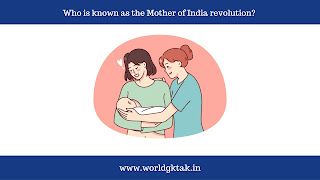The title "Mother of the Indian Revolution" is often attributed to Bhikaiji Rustom Cama, a prominent figure in the Indian independence movement during the early 20th century. Born on September 24, 1861, in Bombay (now Mumbai), Bhikaiji Cama played a crucial role in advocating for India's independence from British rule.
Cama's early life was marked by her involvement in philanthropy and social work. She was deeply influenced by the ideals of freedom, equality, and justice.
In 1896, she moved to London, where she became actively engaged in the Indian nationalist movement. Her residence at 50 Holland Road became a hub for revolutionaries and political activists.
One of the most iconic moments in Cama's revolutionary journey was the 1907 International Socialist Congress in Stuttgart, Germany. Here, she unfurled the first version of the Indian flag, symbolizing India's aspiration for independence.
The flag featured green, saffron, and red stripes with the words "Vande Mataram" inscribed in the center. This act marked her as a fearless advocate for India's self-determination.
Cama's contributions extended beyond symbolic gestures. She was an eloquent writer and orator, using her skills to convey the message of Indian independence on international platforms. In 1909, she published a book titled "The History of the War between England and China," shedding light on the impact of British imperialism.
Despite her significant contributions, Cama faced challenges and opposition from both British authorities and certain factions within the Indian independence movement.
However, her resilience and commitment to the cause remained unwavering. Cama's indomitable spirit earned her the title "The Mother of the Indian Revolution."
Education played a pivotal role in shaping Cama's perspective and activism. She recognized the power of knowledge in fueling social and political change.
Her journey highlights the importance of education as a catalyst for enlightenment and empowerment within the context of a broader struggle for independence.
Bhikaiji Cama's legacy continues to inspire generations of Indians. Her fearless pursuit of freedom, dedication to the welfare of her fellow countrymen, and advocacy for women's rights make her a symbol of courage and resilience. The epithet "Mother of the Indian Revolution" reflects not only her maternal care for the nation but also her pivotal role in nurturing the seeds of change.
In conclusion, Bhikaiji Rustom Cama's life embodies the spirit of India's fight for independence. Her contributions, both symbolic and substantive, have left an indelible mark on the nation's history.
As the "Mother of the Indian Revolution," she stands as a beacon of courage, resilience, and unwavering commitment to the principles of freedom and justice. Bhikaiji Cama's legacy serves as a reminder of the transformative power of individuals who dare to challenge oppressive systems in pursuit of a better, more just world.
Tags:
Question And Answer

